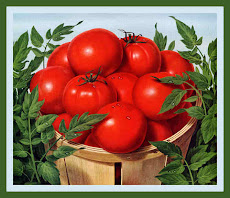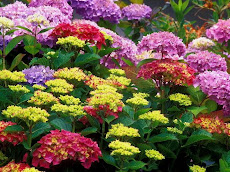It's the time of year when everyone just wants to get outside and enjoy some warm weather. Garden catalogs are filled with colorful pictures of plants, trees, and shrubs. Ideas come from all over for landscaping your land to growing that perfect tomato or fragrant rose. Spring is the perfect time to enjoy the many birds that return to your area as they follow the seasons. They make the "outside" more fascinating and they can help you with your gardening chores.
You can have the best of both worlds - a luscious and bountiful garden and a paradise for birds of all species. It may take a bit of extra work, but the rewards, as the saying goes, are priceless.
Hummingbird feeders at both ends of your garden will give you the opportunity to view these tiny creatures as they zoom in and out. So tiny and yet so very busy all day long. If you have a pea trellis in your garden, you will not only attract the hummingbirds because of the white blossoms that are sweet and full of nectar, but other birds will join them. Bluebirds will perch on the trellis and their snack of choice is caterpillars. Their eyes will catch them and they will snatch them up quicker than you can. They get a taste treat and you get rid of some pesty critters.
A compost pile near your garden with attract a myriad of birds that look for bugs. Allowing the "weeds" in your compost pile to grow, especially those that produce seeds will keep the birds healthy and your garden safe as well.
While you may worry about damage from some birds sampling your garden victories, scattering a few "treats" will take care of any worries. Blue jays love peanuts and dropping a few in your garden aisles will satisfy their cravings. If blackbirds or ravens bother your corn stalks, leave some field corn on the outskirts of your garden and that will keep them busy and occupied outside of your garden space.
Other tips to keep birds nearby but your produce safe, use untreated wood for trellis items and wooden cages. Woodpeckers won't peck and other birds prefer trees to test their beaks on. Hallowed out gourds that you grew last year will blend in perfectly in your tomato patch if allowed to hang from a line just above your plants. The gourd will be hidden by the foliage of the plants, and soon the soft sounds of tiny birds will fill the air while you work in your garden. A perching post somewhere in your garden will give birds a perfect place to keep a keen eye over your hard work and eliminate pests for you. These morsels give them the nutrients they need and birds are great workers. They never tire and best of all - you don't have to pay them.
If you have the room in your garden, placing a bird bath in the middle, surrounded by a patch of gravel, sand, or plain soil will allow the birds a bit of relief from the noonday sun and heat, and the sand will keep lice out of their feathers. They are also a bit safer from predators kept out by your garden fence.
After the first hard frost many of us love to "clean up" the garden of the past year's vines, and leaves. If you enjoy birds, don't pull up the plants - this can be done next Spring. Grosbeaks, goldfinches, wrens, and even robins that may stay a bit longer than other birds will enjoy doing the "cleaning" for you. Cardinals, nuthatches, and woodpeckers will also thank you for the winter food supply. Whether it is left over herbs or even a green tomato left in a tomato cage, this will give them food when the snow covers the rest of the land.
Birds, like many of us, are creatures of habit. They know the "good spots" and are just a bit uneasy to try new places. However, they do venture and while they may not flock to your first attempt to attract them, they will find your garden and its added features that you included just for them. After that, you will be on their flight path and will enjoy their beauty, songs, and help for years to come. That's a great way to join with nature and enjoy the great outdoors.
Something to think about
©Arleen M. Kaptur March, 2009
Sunday, March 22, 2009
Gardening with Our Fine Feathered Friends
Labels:
attracting birds,
birds,
gardening,
organic gardening,
plants,
regional birds
Subscribe to:
Post Comments (Atom)



No comments:
Post a Comment